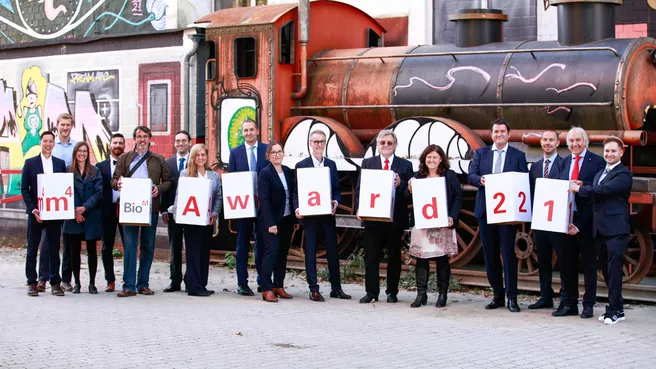With the M4 prize money, the TUM/LMU research team aims to develop peptide-based chemokine receptor mimics as a novel and effective class of drug leads to inhibit specific proteins within the class of chemokines. Such compounds could find application for the pharmaceutical treatment of atherosclerotic cardiovascular diseases.
Atherosclerotic cardiovascular diseases are the leading cause of death worldwide. Atherosclerosis is a lipid-driven chronic inflammatory condition of our arterial vessel walls and the main underlying cause of heart attack and stroke. Despite major medical advances, the so-called residual inflammatory risk remains a problem in a significant number of patients that are already treated with lipid-lowering drugs. Since currently pursued anti-inflammatory approaches have drawbacks and sometimes significant side effects, it is important to develop new improved molecular approaches. Chemokines are important regulators in the atherosclerotic inflammatory process and thus represent such a class of molecules.
The M4 award winning concept of the TUM/LMU research team, which consists of Professor Bernhagen and Professor Kapurniotu as well as their coworkers Markus Brandhofer (LMU) and Christos Kontos (TUM), builds on many years of collaborative work between the scientists in the context of the Collaborative Research Center SFB1123 funded by the German Research Foundation (DFG). In fact, using biochemical-biophysical methods as well as experimental atherosclerosis models in vitro and in vivo the researchers have recently provided a proof-of-principle that synthetic peptides derived from chemokine receptors are able to selectively bind specific chemokines and inhibit their atherosclerosis-causing effects (Kontos, El Bounkari, Krammer et al, Nat Comm (2020); https://www.nature.com/articles/s41467-020-19764-z).
The m4 award project shall contribute to the expansion of the TUM/LMU collaboration, the extensive preclinical validation of the molecular prototypes, and the development of a corresponding start-up concept. Professor Kapurniotu emphasizes that, “until now, the pharmaceutical atherosclerosis market has been dominated mainly by antibodies and small molecule inhibitors, with little attention paid to peptides. But, since peptides could have a number of advantages over the other drug classes as evident, for example, by the large number of approved anti-diabetic drugs, the M4 project now offers an excellent opportunity to advance the preclinical validation of peptide-based chemokine receptor mimics for applications in the cardiovascular field.”
Professor Bernhagen adds, “the complex and redundant receptor and signaling pathways in the chemokine network have been challenging, and the development of new selective approaches is important.” The long-term goal is to develop effective and inexpensive peptide-based drugs for cardiovascular patient groups for which optimal therapeutic concepts are not yet available.
More information:
Researchers from the Technical University of Munich (TUM) are involved in three of the five teams honored with the m4 Award. Information on the other projects can be found here.
About the award:
With the M4 Award initiated in 2011 by BioM ( the network organization of the biotechnology industry in Munich and Bavaria) the Free State of Bavaria promotes innovative products, technologies, and services of young companies that decisively advance the further development of medicine of the future. The prize is awarded every two years. To date, a total of 25 research projects have been honored in the five rounds of competition.
TUM Venture labs:
Every year, 70 to 80 technology-oriented companies are founded at the TUM. TUM Venture Labs offer start-up teams from significant scientific fields a comprehensive system of direct connection to research. As many as 30 teams can use offices in the TUM Incubator to prepare for the launch of their companies. Unternehmer TUM invests in promising technology companies with its own venture capital fund and offers “MakerSpace,” a 1,500-square-meter high-tech workshop for prototyping. According to “Gründungsradar,” this support is the best offered by any major German university.
Editing:
Susanne Neumann
TUM School of Life Sciences
Press and Public Relations
Scientific contact:
Prof. Dr. Aphrodite Kapurniotu
TUM School of Life Sciences
Devision Peptide Biochemistry
Tel. +49 8161 71 3542
akapurniotu(at)tum.de
